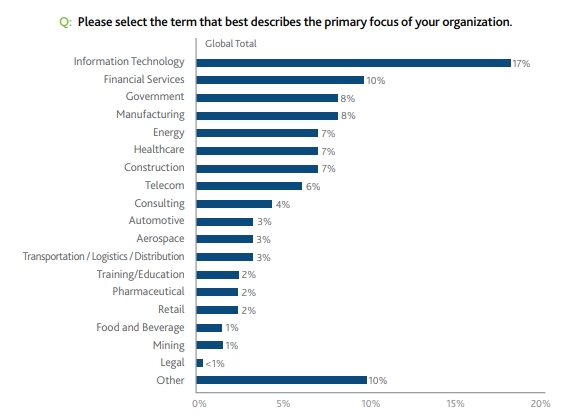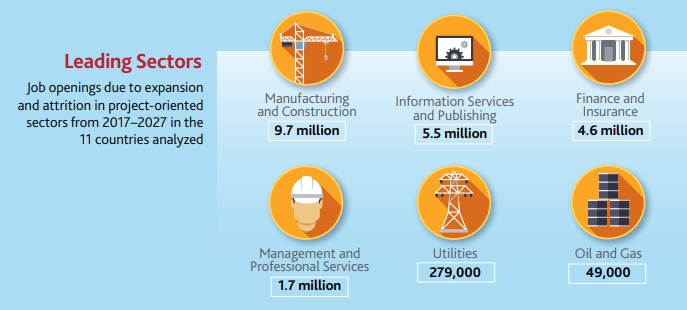Regardless of your skills, background, and experience, you probably have asked yourself a question at least once: what kind of knowledge do I need to be a competitive expert in project management? What what’s more important for my career? According to The State of Project Management Report 2020, one of the greatest PM challenges is poorly trained project managers. Needless to say that solid knowledge in the theory of project management and familiarity with PM software are the foundation of professional success. And in this publication, we discuss the role of industry, product, and technical knowledge in the work of a project manager.
Industry Knowledge in Project Management Career: What to Focus on?
What is Industry Knowledge?
By industry, we mean a certain area of business, for example, construction, pharmacy, healthcare, and so on. Industry knowledge implies the understanding of the sector’s specificity, processes, regulations, job responsibilities, market trends, and things alike.
What Industries Do Project Managers Work in?
According to PMI’s Pulse of Profession with 4,455 project professionals engaged, the biggest number of PMs work in the IT and the financial services sectors. The percentage ratio is presented in the picture below.

According to PMI’s Job Growth and Talent Gap in Project Management 2017-2027, throughout these years, the biggest number of vacancies in PM will be suggested by the manufacturing and construction sector.

The Role of Industry Knowledge in Project Management
So how can industry knowledge help a project manager in his or her job? We distinguish at least four reasons why it’s beneficial to possess it.
Clients, Senior Executives, and Stakeholders
Industry knowledge implies the ability to understand its foundations and use the lingo. Without its knowledge, your communication with clients, stakeholders, and senior executives may turn ineffective cause you won’t have a clue what they’re talking about.
- Misunderstandings may either make you spend more time figuring out unclarity and fill in the gaps or negatively affect project success.
- People won’t take you seriously if you don’t understand them. Industry knowledge is a guarantee of your reputation and credibility.
Project Requirements
As stated in PMI’s Pulse of the Profession® (2014), inadequate project requirements are the cause of project failure in 37% of organizations. Project requirements are a set of conditions including processes and tasks necessary for project initiation, its progress, and completion. With good industry knowledge, it’ll be easier for you to collect project requirements and ensure its successful delivery.
Production Processes
Industry knowledge also covers a deep understanding of the processes within the industry. PMs can use this knowledge to estimate the time needed for accomplishing tasks, order them, and allocate resources adequately. Being in the know of industry specificity and job responsibilities, resource allocation becomes less challenging and takes less time.
Risk Management
Industry knowledge will help you identify probable risks and manage them. Besides, it will make you better understand the project’s weaknesses and correct them correspondingly.
Industry Challenges and Trends
In addition, a PM should be aware of the trends of the industry he or she works in. Should we say that PM trends are not common among different industries? For example, the pharmaceutical industry is now facing a lot of challenges due to pandemic, the shipbuilding sector is trying to cope with the resource gap and needs a reasonable approach to resource allocation. Awareness in this field will help a project manager analyze a project, its possible complications and risks, and suggest approaches to ensure its successful delivery.
How to Gain Industry Knowledge?
The overview of project managers’ experience shows that often people start their career working in different roles in the industry, gaining this specific knowledge, and only then switch to project management.
Can’t a project manager start his or her career from the position of a junior PM?
Of course, they can. There are several tips on getting industry knowledge:
- Use social media. For example, in LinkedIn and Facebook groups dedicated to a certain industry you can communicate with experts, ask questions, read relevant articles, and more.
- Take part in industry-related webinars, seminars, conferences, meetups, discussions, and events alike.
- If you’re a PM at a company, find a coworker who is an expert in the field, and don’t miss any opportunity to talk shop.
What’s Product Knowledge?
Product knowledge is an awareness of what’s being produced and a deep understanding of its features, advantages, and peculiarities. A person who possesses product knowledge can discuss a product with someone else and present it to the audience with ease. As a rule, product knowledge is a must for the marketing team and of course product manager.
Product Manager and Project Manager: What’s the Difference?
People often confuse product and project managers and don’t see any difference between these positions. This also happens because of the same acronym used for both concepts: PM. In reality, they do differ.
- A product manager is responsible for a product: the idea in general, the process of creation, strategy, and as a result, customer satisfaction.
- A project manager is in charge of product creation by implementing the suggested strategy: he or she controls every operation and every team member to complete their tasks on time and within budget.
Do Project Managers Have To Possess Product Knowledge?
It’s critical to understand that a project is a set of timely measures aimed at creating a product. It has its start and end dates. In other words, a project is a more general concept but it implies being aware of its core – the product. You can’t manage a project you know nothing about. So, any project manager should have a clear idea of the product’s functionalities, benefits, strengths and weaknesses, and all related information. It’s necessary at least for the following reasons:
- Clients communicate their concerns and remarks regarding the product to a project manager, who, in turn, should process this information and set corresponding tasks to team members. If he or she doesn’t have product-related knowledge, it will be impossible, and the client’s needs and requirements won’t be ever satisfied.
But there’s a remark: it depends on the size of the company you work for. In many organizations, these are the duties of a product manager, while in smaller companies it’s up to a project manager to discuss these things and resolve issues.
- The project manager’s work involves a lot of communication with the team. Without corresponding knowledge, it’ll be ineffective.
Read more about PM’s responsibilities: How to Start a Career in Project Management: Answers to FAQ
How to Gain Product Knowledge?
There are several ways to get as much information about the product as possible:
- Talk to a product manager/product owner,
- Talk to clients to analyze their idea, requirements, and needs to create your view of the product.
Do Project Managers Have to Possess Technical Knowledge?

First off, let’s distinguish between a technical project manager and a non-technical PM. Here we’re talking about non-technical experts.
On the whole, a project manager doesn’t necessarily have to possess technical knowledge BUT it depends on some circumstances:
- Whether your company is small or large.
Let’s figure it out. If you work for a large corporation, technical knowledge isn’t a must for you as there are lots of different roles in organizations like that, and duties are accurately allocated. So, most likely this is the area of tech lead’s responsibility. But if your company is small and doesn’t have such a role as Scrum master, tech lead, or even product manager, perhaps you’ll have to dig into technical details while managing the product.
- Your career journey stage and your ambitions.
If you’d like to participate in discussions and be able to influence decisions regarding product creation, nobody can inhibit you from gaining technical expertise. It depends on the structure and rules in your company. So it’s up to you to decide whether you need this kind of knowledge.
And there are at least two aspects a non-technical project manager should know:
- Technical terminology,
- Architecture and infrastructure.
Managing a project will be difficult without the ability to understand the general technical foundations of the processes as well as understanding the meaning of core technical terms. The ignorance in this field may significantly complicate the communication between a PM and technical specialists.
How to Gain Technical Knowledge?
The recommendations are similar to acquiring industry knowledge, just decide upon what kind of information you need and why, and
- Use social media,
- Take a course,
- Participate in events,
- Talk to coworkers in technical positions.
Summary
The role of industry, product, and technical types of knowledge in PM’s job is more or less equally crucial but still, there’s some difference.
- Industry expertise is the broadest type of knowledge. It can serve as a good background for project managers and help them in their job. A project manager who has profound knowledge of the industry he or she works in is more likely to build an excellent career. It also helps them manage projects as they’re aware of the processes, peculiarities, risks, and other related things associated with the industry.
- Product knowledge is very specific but is also crucial for a PM. In this context, you should understand the difference between product and project managers. Anyway, a project manager should know everything about the product at least at the user level as a project is a timely endeavor aimed at product creation and launch.
- Technical knowledge is the most specific type of expertise. It’s not a must for a project manager but depending on some circumstances, it can be useful. And we’re sure it won’t hurt anyway.
Conclusion
Knowledge is power, and it can’t be redundant for any expert. The project management sector is no exception. The more you know, the better for your career. The necessity of having industry, product, and technical knowledge depends on the company a project manager works for, on its standards, rules, and regulations, and of course on a PM himself/herself, including ambitions, career plans, and interests. One thing is airtight: self-development is a must. Participate in related events, read news and literature, and don’t forget about networking.

